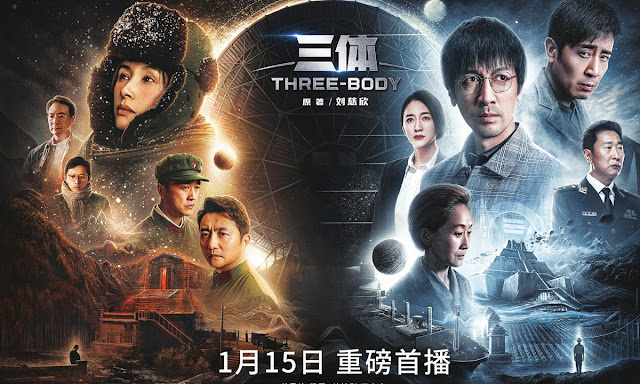 |
| In "Three-Body," a Chinese adaptation of the novel "The Three-Body Problem," actor Zhang Lu Yi portrays a physicist who is working to uncover a vast conspiracy |
The recently released Chinese television series "Three-Body," an adaptation of the highly acclaimed science-fiction trilogy of novels, has elicited strong reactions due to its cultural significance and historical context. The "Three-Body" trilogy, which portrays Earth being threatened by an alien invasion, is widely seen as a reflection of historical Chinese anxieties about Western domination.
Interestingly, 17 years after the publication of the books, the series is gaining more attention than ever before with the imminent release of a big-budget American adaptation on Netflix later this year. This has sparked a discussion on the topic of appropriation and cultural sensitivity, which is likely to become a hot topic as soon as the episodes are available to the public.
It's important to note that this review contains spoilers for both the novel "The Three-Body Problem" and the television series "Three-Body."
 |
| Three Body Cdrama |
The Chinese series "Three-Body" has debuted on the American streamer Rakuten Viki with English subtitles and is premiering simultaneously in China
. This series has beaten Netflix's "3 Body Problem" to the screen and is reportedly setting viewing records for Tencent’s WeTV streaming service in China. Although the series is yet to cause a stir in the United States, it has received positive reviews from sci-fi fans.
Unlike the Netflix series, which features a largely non-Chinese cast, "Three-Body" is seen as being faithful to the first novel of the highly acclaimed trilogy "Three-Body," which is written by Liu Cixin.
Although Liu has endorsed the Netflix adaptation as a consulting producer, he does not seem to have been involved with the Chinese series.
While the Netflix adaptation of "The Three-Body Problem" is drawing attention for its largely non-Chinese cast and potential changes to Liu Cixin's original story, the Chinese series "Three-Body" is receiving recognition for its adherence to the first novel in the trilogy.
However, this loyalty to the source material may not be enough to appeal to a wider audience. For die-hard fans of Liu's work, the show's similarities to the book may be a selling point.
However, the heavy reliance on the original dialogue and plot points may not be enough to captivate those unfamiliar with the story.
Liu Cixin's "The Three-Body Problem" is set in Beijing during the mid-2000s and features flashbacks to the countryside 40 years prior
. It is a mystery that follows the journey of a reserved physicist, Wang Miao, and a lively cop, Shi Qiang, as they investigate a series of suicides among top-level scientists.
Their investigation leads them to uncover a conspiracy that dates back to the Cultural Revolution and requires Wang to immerse himself in a virtual-reality video game with cosmic ramifications.
 |
| Three-Body’ Review: A Chinese Series Beats Netflix to the Screen |
The creators of the Chinese adaptation of "The Three-Body Problem" have maintained the central elements of Liu's original story while making some changes to enhance the series' appeal to a wider audience.
They have updated the setting to 2007 and emphasized the buddy-cop relationship between Wang and Shi. The details of police work are given more attention and new characters, primarily female, have been introduced or expanded, including a journalist, Shi's deputy, and Wang's wife.
The series also includes scenes of humor and suspense not related to science fiction. Despite these changes, the series remains true to Liu's style and the science-driven narrative of the original novel.
The "Three-Body Problem" series, based on Liu Cixin's novel, presents a challenge for audiences unfamiliar with Asian dramas. The science-driven plot, with its focus on mathematical proof, requires patience and an appreciation for speculative science fiction. However, the show's stilted subtitling and lack of production quality may be a turn-off for some viewers.
Despite these limitations, the series delivers a captivating story, complete with a history of scientific and technological advances, and a comedic, but the suspenseful relationship between the two main characters, Wang Miao and Shi Qiang. The nighttime images of Beijing and the countryside are stunning, but the 3-D animation fails to capture the vivid imagery of the book's video game scenes.
Despite these challenges, if you're willing to overlook these shortcomings, you'll be rewarded with a good tale that is well explained. The series has a tendency to repeat information, which is common in Chinese TV dramas, but it also means that if a plot twist is confusing, it will be clarified before the scene is over.




0 Comments